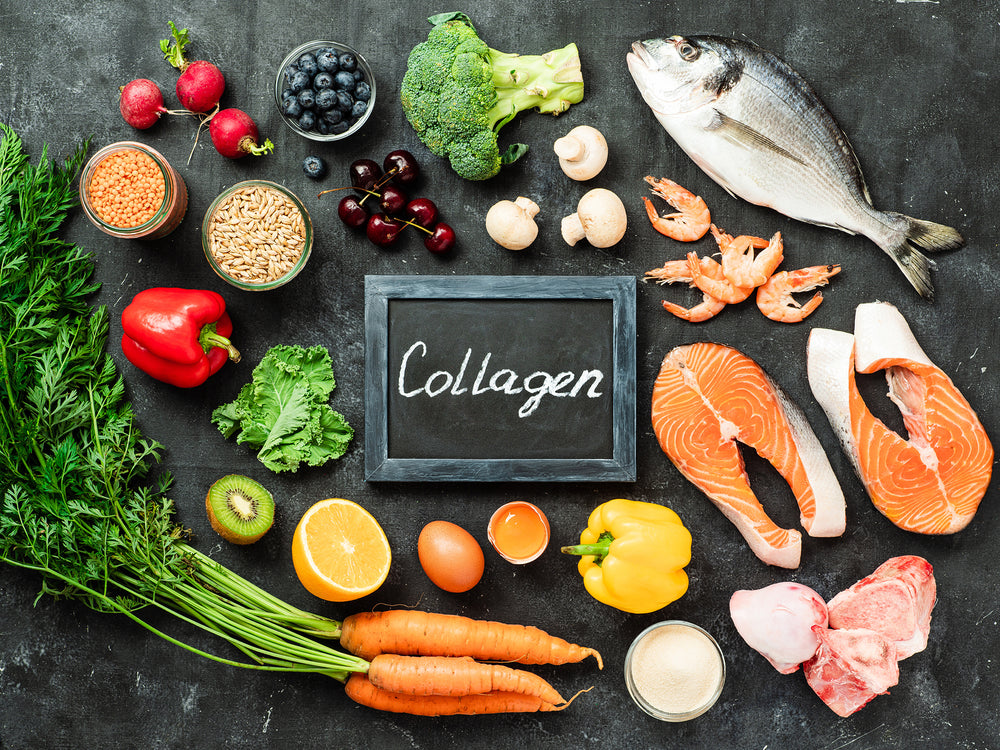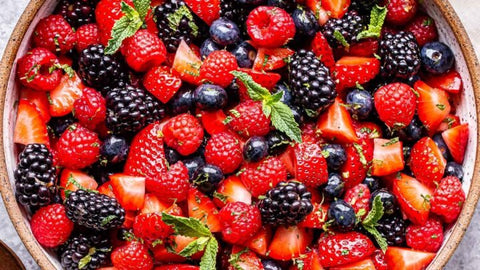
Top 5 Foods That Increase Collagen Production
Last updated on December 9, 2022

Collagen is a protein that helps us look younger on the outside and feel better on the inside.
It is the most abundant protein in the human body and the main component of our connective tissues. It provides structural support to our skin, muscles, bones, tendons, ligaments, organs, blood vessels, intestinal linings, and more.
While our body naturally produces collagen, you can boost your collagen production through foods or supplements.
Aging is the main factor as to why we start losing collagen. In this blog, we're sharing the 5 best collagen-rich foods that help increase your body's collagen production.
Related article: What are sea moss benefits for your skin?
Organics Nature's Collagen + Sea Moss Powder - Try it here!
1. Foods Rich in Lysine like Meat & Poultry

Lysine is an essential amino acid that plays a major role in supporting collagen production. Studies have shown that lysine deficiency leads to poor collagen quality and weak arteries. Getting a sufficient amount of this amino acid is essential to support healthy skin, lips, hair, and body function.
Not only is lysine essential for the production of collagen, but if your body has a lysine deficiency, it can lead to tiredness, irritability, retarded growth, hair loss, anemia, and reproductive problems.
The body can not make lysine, so you must get it from foods or supplements. Meat and poultry are among the richest foods in lysine, but you can also find it in plant-based ingredients like legumes, nuts, or seeds.
2. Plant-based Proline-Rich Foods for Collagen

Proline is another important amino acid in collagen production. It's absolutely necessary for skin health and wound healing.
Proline isn't an essential nutrient in the way that your body can produce it on its own. However, boosting its intake has proven to improve collagen quantity and quality.
There are many ways you can add proline to your diet. Plant-based foods like asparagus, mushrooms, and cabbage are very rich in proline. Incorporating a healthy dose of these into your diet eventually helps increase your natural collagen production.
3. Vitamin C Foods Like Berries

Any berries, including blueberries, raspberries, strawberries, blackberries, and others, are a great source of Vitamin C. Vitamin C is an essential piece of collagen production and synthesis. It helps build collagen in our body.
Berries are a great way to boost your vitamin C intake and, ultimately, your collagen. It is also a vitamin we need to include in our diet since it is not naturally found in the body. Some other Vitamin C-rich foods include bell peppers, broccoli, and citrus fruits.
4. Plant-based Foods Rich in Glycine

Another amino acid that plays a vital role in increasing our body's collagen production is glycine. It's actually the main amino acid found in collagen. This amino acid is used daily, and the body cannot function properly without it.
The body produces small amounts of glycine naturally, so it's not considered an "essential" amino acid. But it can be found in many foods, and boosting your glycine intake through diet is an efficient way to increase your collagen.
Diets rich in glycine help improve skin health, relieve joint pain, and prevent bone loss. Some glycine-rich foods include beans, nuts, and seeds.
5. Sea Moss Boosts Collagen Production
You may have heard that sea moss is now considered one of the best superfoods. It's extremely rich in nutrients and has an endless number of health benefits.
It's also one of the best plant-based sources of collagen! While it does not contain collagen itself, it has high levels of nutrients that boost the body's collagen production, notably zinc, copper, and vitamin C. The efficiency of body-produced collagen is proven to be much higher than collagen supplements.
Zinc is a mineral that acts as a cofactor in the production of collagen and plays a vital role in collagen synthesis. Therefore, zinc deficiency can decrease your collagen production.
Copper is another sea moss component that positively impacts your collagen. It's required to form red blood cells, bone, and connective tissue.
People who consume sea moss daily rapidly found a significant improvement in their skin appearance.
Related article: The complete list of minerals and vitamins in sea moss
Our diet plays a crucial role in collagen production. A collagen-inclusive meal plan that includes plenty of collagen-rich foods and foods that help increase collagen production can have great impacts on your skin and body.
Although you can get collagen supplements, eating foods like sea moss that naturally boost your body's own collagen production is more efficient.
Organics Nature has made it simple. We've formulated the World's 1st blend of collagen peptides and sea moss. It combines the benefits of direct collagen supplementation with the essential nutrients to boost your own collagen production. The ultimate combo!
Try Organics Nature's Collagen Peptides & Sea Moss Powder Now!





3 comments
Can I order the "Collagen Peptides + Irish Sea Moss "?, if not could you let me know when it becomes available again. Thank you
Halfway through my first jar. Use it in my morning cup of coffee. Trust it is making a difference!
I’m so excited to try the sea moss, I’m 66 years old and I never knew the benefits of this product. Can’t wait, I eat all of the foods you talked about, however this covers so much more. Thanks for the insight.